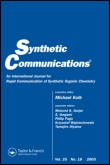
SYNTHETIC COMMUNICATIONS
Scope & Guideline
Unveiling Breakthroughs in Synthetic Communications
Introduction
Aims and Scopes
- Development of Novel Synthetic Methods:
The journal highlights the introduction of new and efficient synthetic methodologies, including one-pot reactions, multicomponent reactions, and the use of green chemistry principles. - Heterocyclic Chemistry:
A significant portion of the published research targets the synthesis of heterocyclic compounds, which are crucial in pharmaceuticals and agrochemicals. - Catalysis in Organic Synthesis:
Many articles focus on the role of various catalysts, including metal-catalyzed and organocatalytic processes, enhancing reaction efficiency and selectivity. - Biological Applications:
The journal features studies that not only synthesize new compounds but also evaluate their biological activities, particularly in medicinal chemistry. - Green Chemistry Approaches:
There is a consistent emphasis on sustainable and environmentally friendly synthesis methods, including solvent-free conditions and the use of renewable resources.
Trending and Emerging
- Multicomponent Reactions (MCRs):
There is a growing trend towards MCRs, which allow for the simultaneous formation of multiple bonds and are highly efficient for synthesizing complex molecules. - Nanocatalysis:
The use of nanomaterials as catalysts is becoming increasingly popular, reflecting advancements in catalyst design that improve reaction conditions and yield. - Sustainable and Green Chemistry Practices:
Emerging themes include the development of eco-friendly synthetic protocols, emphasizing the reduction of waste and the use of renewable resources. - Biologically Active Compound Synthesis:
A notable increase in the synthesis of compounds with potential pharmaceutical applications, particularly those targeting cancer and antimicrobial activities, showcases the journal's alignment with current medicinal chemistry trends. - Innovative Heterocyclic Synthesis:
There is a rising interest in the synthesis of diverse heterocycles, reflecting their importance in drug discovery and development.
Declining or Waning
- Traditional Synthetic Methods:
There has been a noticeable reduction in papers focusing solely on classical synthetic methods without innovative modifications or improvements, as the field moves towards more advanced and efficient techniques. - Synthesis of Simple Organic Compounds:
Research targeting simpler organic compounds with little to no biological relevance has decreased, reflecting a shift towards more complex and biologically active molecules. - Single-Component Reaction Studies:
The frequency of studies concentrating on single-component reactions without comprehensive multi-step or multi-component approaches appears to be waning.
Similar Journals

ARKIVOC
Exploring the Frontiers of Organic Chemistry TogetherARKIVOC is an esteemed open-access journal dedicated to the field of Organic Chemistry, published by ARKAT USA INC. Since its inception in 2000, ARKIVOC has aimed to disseminate high-quality research and advancements in organic chemistry, fostering an international exchange of knowledge within this ever-evolving discipline. With its ISSN 1551-7004 and E-ISSN 1551-7012, the journal is committed to providing accessible content free of charge to researchers, students, and professionals around the globe. Although currently categorized in the fourth quartile of Organic Chemistry with a Scopus rank of #188 out of 211, ARKIVOC continues to encourage the publication of innovative works and critical reviews that highlight emerging trends and methodologies in organic synthesis, reaction mechanisms, and material sciences. Its open-access model since 2000 ensures that valuable contributions to scientific knowledge are widely available, promoting collaboration and discovery. The journal is based in the United States, with its editorial office located at the University of Florida, under the guidance of prominent chemists. ARKIVOC provides an essential platform for those deeply engaged in organic chemistry research, supporting the advancement of science for future generations.
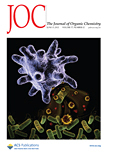
JOURNAL OF ORGANIC CHEMISTRY
Advancing Organic Chemistry Through Innovative ResearchJournal of Organic Chemistry, published by the American Chemical Society, is a prestigious peer-reviewed journal dedicated to advancing the field of organic chemistry. With an ISSN of 0022-3263 and an E-ISSN of 1520-6904, this journal has established itself as a key platform for disseminating high-quality research since its inception in 1936. Residing in the Q2 category for Organic Chemistry as of 2023, it ranks #64 out of 211 in Scopus, positioning itself within the top 69th percentile of its field. Researchers and professionals can access vital findings and innovative methodologies that drive the understanding and application of organic chemical principles. Although the journal is not open access, it remains a crucial resource in academia and industry, contributing significantly to the scientific community's knowledge base. For detailed insights and cutting-edge research, the journal continues to be an essential read for those engaged in the dynamic and evolving landscape of organic chemistry.

JOURNAL OF HETEROCYCLIC CHEMISTRY
Navigating the World of Organic InnovationsJournal of Heterocyclic Chemistry, published by Wiley, stands as a key resource in the field of organic chemistry, offering in-depth research articles and insights spanning from 1966 to 2024. With its strong Scopus ranking of #83 out of 211 in the Organic Chemistry category, placing it in the 60th percentile, the journal maintains its significance and relevance within the academic community. Although it does not currently offer open access options, it provides extensive coverage of heterocyclic compounds, which are vital to various applications in pharmaceuticals and material sciences. The journal's commitment to high-quality research is further reflected in its classification as Q3 in the 2023 quartiles for Organic Chemistry. Researchers, professionals, and students alike will find valuable contributions to the intricate studies of heterocycles, enhancing their understanding and exploration of this fascinating area of chemistry.
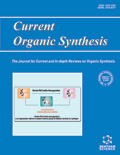
CURRENT ORGANIC SYNTHESIS
Advancing the Frontiers of Organic ChemistryCURRENT ORGANIC SYNTHESIS, published by Bentham Science Publishers Ltd, is a leading journal in the field of organic chemistry and biochemistry that serves as a vital platform for researchers and professionals advancing the synthesis of organic compounds. With an ISSN of 1570-1794 and an E-ISSN of 1875-6271, it boasts a significant impact within its category, ranked in the Q3 quartile for both biochemistry and organic chemistry as of 2023. The journal covers innovative research and reviews that enhance our understanding of organic synthesis methodologies, showcasing contributions that advance the field. Operating from Sharjah, United Arab Emirates, CURRENT ORGANIC SYNTHESIS has evolved since its inception in 2005, providing access to a wealth of information essential for students, professionals, and researchers alike. While it currently does not offer open access, the journal continues to maintain a strong community of scholars dedicated to fostering dialogue and innovation in the organic sciences.

ACS Organic & Inorganic Au
Elevating Research Standards in Chemical InnovationACS Organic & Inorganic Au, published by the American Chemical Society, stands as a premier open-access journal dedicated to advancing the fields of organic and inorganic chemistry. Since its inception in 2021, this journal has swiftly risen to prominence, achieving a commendable Q1 classification in Inorganic Chemistry, Organic Chemistry, and Physical and Theoretical Chemistry as of 2023. With an ISSN of 2694-247X, it provides a vital platform for researchers, professionals, and students to disseminate their findings and engage with cutting-edge work across converged disciplines. Operating from its headquarters in Washington, DC, ACS Organic & Inorganic Au is committed to fostering a collaborative research environment, encouraging rigorous peer review, and ensuring the wide accessibility of high-quality scholarly articles. With its open-access model, readers worldwide can freely access and utilize research findings, promoting a global exchange of knowledge crucial for driving innovation in chemistry.
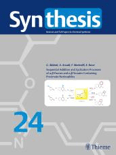
SYNTHESIS-STUTTGART
Innovating Synthetic Methodologies for a Sustainable Future.SYNTHESIS-STUTTGART
Published by the esteemed Georg Thieme Verlag KG, SYNTHESIS-STUTTGART stands as a vital resource in the field of Chemistry, specifically focusing on Organic Chemistry and Catalysis. With an impressive publication history dating back to 1970 and continuing through 2024, it serves as a platform for innovative research and developments in synthetic methodologies and their applications. The journal holds a significant impact factor, reflecting its influence within the academic community, and is recognized in the Scopus rankings as a reputable source in its categories, with a rank of #99/211 in Organic Chemistry and #43/68 in Catalysis. Researchers, professionals, and students alike can benefit greatly from its content, which upholds rigorous peer-review standards and contributes to the global discourse in these critical scientific domains.

Asian Journal of Organic Chemistry
Connecting scholars through groundbreaking organic chemistry insights.Asian Journal of Organic Chemistry, published by WILEY-V C H VERLAG GMBH, stands as a pivotal platform in the realm of organic chemistry, catering to researchers and professionals eager to share their contributions to the field. With an ISSN of 2193-5807 and E-ISSN of 2193-5815, this journal spans a commendable convergence from 2012 to 2024, featuring a notable impact factor highlighted by its Q2 ranking in the 2023 Organic Chemistry category. Positioned at rank #94 out of 211 in Scopus, the journal emphasizes the importance of quality research and innovation in organic chemistry. The lack of open access enhances the journal's selectivity, ensuring only the most rigorous and impactful studies are published. Serving as a vital resource for scholars, students, and practitioners alike, the Asian Journal of Organic Chemistry fosters the dissemination of knowledge, advances academic dialogue, and reinforces the pivotal role of organic chemistry in scientific advancement.

CHINESE JOURNAL OF ORGANIC CHEMISTRY
Exploring the Frontiers of Organic CompoundsThe Chinese Journal of Organic Chemistry, published by Science Press, serves as a pivotal platform for advancing the field of organic chemistry since its inception in 1996. With an ISSN of 0253-2786, this esteemed journal provides robust scientific contributions, reflecting significant advancements and novel findings that are crucial to the organic chemistry community. As of 2023, it is categorized in the Q3 quartile of organic chemistry journals, positioning it within the competitive landscape of this vibrant research area, ranking #147 out of 211 in Scopus, corresponding to a 30th percentile ranking. The journal is committed to fostering a scholarly exchange of ideas and research, making it an essential resource for researchers, professionals, and students dedicated to exploring the complexities and applications of organic compounds. The Chinese Journal of Organic Chemistry continues to support the dissemination of high-quality research that contributes to both local and global scientific endeavors.

ORGANIC SYNTHESES
Exploring the Depths of Organic SynthesisORGANIC SYNTHESES is a prestigious journal dedicated to the field of organic chemistry, published by ORGANIC SYNTHESES INC. Since its inception in 1946, the journal has served as a vital platform for researchers, educators, and practitioners in chemistry, showcasing significant findings and methodologies that advance the discipline. Although it currently does not offer open access, it is recognized for its rigorous peer-review process and its contribution to standardizing organic synthesis methods. With an ISSN of 0078-6209 and an E-ISSN of 2333-3553, the journal's impact reflects its quality, with a current Scopus ranking placing it in the fourth quartile in both Organic Chemistry and Physical and Theoretical Chemistry. This positioning underscores its critical role in fostering knowledge and innovation within these fields. Researchers and students alike will find ORGANIC SYNTHESES an essential resource for staying informed on contemporary practices and discoveries in organic synthesis.
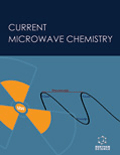
Current Microwave Chemistry
Pioneering Research in Microwave Chemistry for Tomorrow's SolutionsCurrent Microwave Chemistry is a pioneering academic journal dedicated to the dynamic and rapidly evolving field of microwave-assisted chemistry. Published by Bentham Science Publishers Ltd, this journal aims to disseminate high-quality research that explores innovative methodologies, novel applications, and the fundamental principles underlying microwave technology in chemical processes. Offering a platform for researchers, professionals, and students, Current Microwave Chemistry plays a crucial role in enhancing the understanding and application of microwave chemistry across disciplines such as synthetic chemistry, materials science, and pharmaceutical research. By facilitating open access to groundbreaking studies, this journal encourages collaboration and knowledge exchange, positioning itself as an essential resource for those looking to push the boundaries of what is achievable in chemical science.